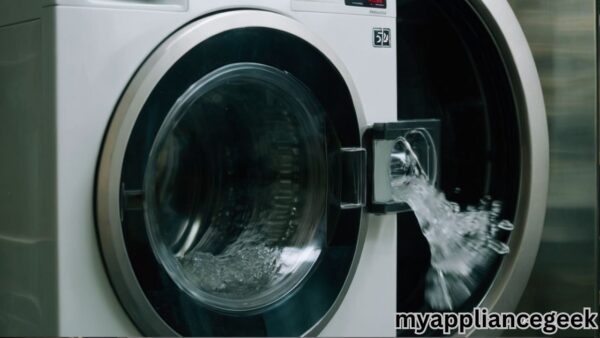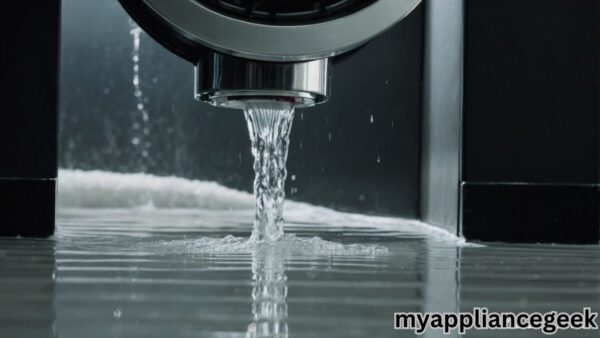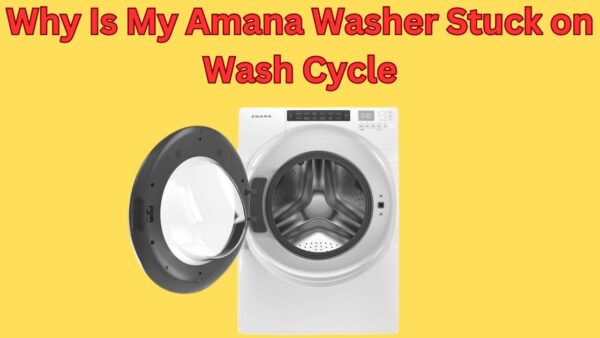Hi, dear visitor if you are facing problems like rinse aid leaking from the bottom.
So Don’t worry this is a common thing.
In this guide, we found 10 common reasons for this problem with unique solutions. So let’s start now
Rinse Aid Leaking From the Bottom

1. Faulty Rinse Aid Dispenser
Cause
A malfunctioning rinse aid dispenser is often the culprit behind the leakage of rinse aid from the bottom of a dishwasher.
This issue can be due to a crack or break in the dispenser, or a fault in the dispenser door that prevents it from closing properly.
The rinse aid then spills out freely causing a leak.
Solution
The most effective remedy is to replace the faulty dispenser.
Start by identifying the model number of your dishwasher and purchasing an appropriate replacement.
You can then remove the damaged dispenser and install the new one. However, it’s recommended to hire a professional if you’re not comfortable with DIY repairs as it involves dealing with electrical elements.
Regular maintenance checks of your dishwasher can help prevent such issues in the future.

2. Damaged Door Seal
Cause
A damaged door seal is one possible cause of rinse aid leaking from the bottom of your dishwasher.
Over time, the rubber seal that surrounds the dishwasher door can become worn, cracked, or even torn, creating gaps through which rinse aid can escape.
Frequent use, harsh cleaning chemicals, and high heat can all contribute to the degradation of the door seal.
Solution
The most effective solution is to replace the damaged door seal with a new one.
Turn off and unplug the dishwasher before starting any repairs.
Next, remove the damaged seal carefully, making note of its orientation for ease of installation of the new one.
Finally, install the new seal, ensuring it fits snugly and securely.
After installation, run a test cycle to verify the leak has been resolved. It’s always a good idea to refer to the dishwasher’s manual or consult a professional if in doubt.
3. Incorrectly Installed Dispenser Cap
Cause
The root cause of the rinse aid leaking from the bottom might be an incorrectly installed dispenser cap.
The dispenser cap is an essential part of containing the rinse aid, acting as a seal against leaks.
If it’s not installed correctly, the rinse aid can easily leak out, creating a mess and reducing the effectiveness of your dishwasher.
Solution
The solution lies in reinstalling the dispenser cap correctly.
Always make sure that the dispenser cap is tightly secured. If you are unsure of how
4. Overfilling of the Rinse Aid Compartment
Cause
The Rinse Aid compartment is designed to hold a specific amount of rinse aid.
Overfilling the compartment can create excess pressure, which may cause the rinse aid to leak from the bottom.
Solution
To address this issue, carefully refill your Rinse Aid compartment, ensuring it is not overflowing.
Most compartments have a visible line indicating the maximum fill level.
Overfilling can be easily mitigated by adhering to the manufacturer’s instructions regarding the proper quantity of rinse aid to be used.
This way, you can prevent leaks and ensure optimal performance of your dishwasher.
5. Worn Out Dispenser Gasket
Cause
The Rinse Aid Dispenser Gasket, a crucial component of your dishwasher, ensures a water-tight seal. Over time, the gasket can wear out or deteriorate, leading to a rinse aid leak.
Factors contributing to the wear include frequent use, harsh cleaning chemicals, and high water temperatures.
Solution
The primary solution for a worn-out dispenser gasket is replacement.
You should first acquire a replacement gasket specific to your dishwasher model.
Then, turn off the dishwasher and disconnect it from the power source.
Remove the dispenser’s old gasket carefully and clean the area to eliminate any residue before installing the new gasket.
Ensure a proper fit to prevent future leaks.
If you are not comfortable performing these tasks yourself, it’s advisable to hire a professional.
6. Cracked Rinse Aid Container
Cause
One of the common causes of Rinse Aid leaking is a cracked Rinse Aid container.
This can happen due to mishandling, overuse, or even manufacturing defects.
When the container is cracked, the Rinse Aid will not be able to stay inside the container and will leak out, usually from the bottom.
Solution
To tackle this problem, the first step is to identify the location of the crack.
Once identified, check if the crack is small enough to be sealed using a waterproof adhesive or a dishwasher-safe sealant.
If the crack is too big or the container is too damaged, the best solution is to replace the Rinse Aid container entirely.
Always remember to handle these containers with care to avoid any further cracks and leaks.
7. Loose Dispenser Assembly
Cause
A loose dispenser assembly is a common reason for a rinse aid leak in dishwashers.
Over time, wear and tear or improper handling can result in the loosening of the dispenser assembly.
This leads to small gaps, from which the rinse aid can easily leak.
In essence, the dispenser assembly acts like a gatekeeper, controlling the flow of rinse aid.
Solution
When dealing with a loose dispenser assembly, the most straightforward solution is to tighten it up.
First, you would need to locate the dispenser assembly in your specific dishwasher model, which is typically found on the inside of the door.
Once located, a screwdriver can be used to tighten the assembly, ensuring there are no gaps left for leakage.
In cases where the assembly is damaged or overly worn, replacement may be the only viable solution.
Be sure to consult your user manual or a professional technician for detailed instructions based on your specific dishwasher model.
8. Inadequate Rinse Aid Viscosity
Cause
The viscosity, or thickness, of the rinse aid, plays a crucial role in its function.
If the rinse aid is too thin, it can leak out of the dispenser and onto the bottom of the dishwasher.
This leakage can cause a waste of rinse aid and may also hinder the proper operation of your dishwasher.
Solution
The ideal solution is to replace the low-viscosity rinse aid with a higher-viscosity option.
Be sure to select a brand renowned for its quality to avoid a similar issue in the future.
Once the rinse aid has been replaced, monitor the dishwasher for any recurrent leaks to ensure the problem has been resolved.
Consulting with a professional repair service is recommended if the problem persists.
9. Improper Alignment of Dispenser Parts
Cause
The improper alignment of dispenser parts can be a common cause of rinse aid leaking from the bottom.
If the dispenser’s elements are not correctly positioned, the seal that prevents the rinse aid from escaping can be compromised, leading to leakage.
Over time, the misalignment can worsen, potentially causing a more significant leak and eventually the dispenser’s malfunction.
Solution
To resolve this issue, it’s crucial to realign the dispenser parts properly.
If you’re comfortable doing so, you can attempt this task yourself; however, it might be best to consult a professional for assistance to avoid causing further damage.
Always make sure to turn off and unplug the dishwasher before attempting any repairs.
Regular maintenance and checking the alignment of the parts can prevent this problem from recurring.
It’s always better to address minor alignment issues immediately to prevent them from escalating into more significant problems.
10. Defective Rinse Aid Pump
Cause
Defective rinse aid pumps may be the cause of leaks at the bottom of your dishwasher.
This can occur when the pump develops a crack or when the seal that keeps the rinse aid contained is compromised.
These situations can lead to rinse aid escaping from the pump and leaking out of the bottom of the appliance.
Solution
To rectify this issue, you may need to replace the rinse aid pump.
Always ensure to unclog your dishwasher prior to making any repairs.
If you are not comfortable with performing the repair yourself, it is recommended to hire a professional.
Remember, using an original replacement part is crucial to ensure the longevity and efficient performance of your dishwasher.
Conclusion
In conclusion, a leaking rinse aid dispenser is often a sign of a faulty pump.
The pump, when working correctly, efficiently distributes rinse aid during the dishwasher’s cycle to produce spotless, dry dishes.
However, when a defect occurs, the pump might leak, causing an excess distribution of rinse aid.
This not only wastes the rinse aid but can also lead to poor washing results.
Therefore, it is crucial to address this issue promptly.
Depending on the severity of the defect, this might involve repairing or replacing the pump.
Always consult with a professional appliance repair technician to ensure the correct and safe resolution of the issue.
FAQs
Why does rinse aid leak on Bosch dishwashers?
Rinse aid may leak in Bosch dishwashers due to a damaged dispenser or if it’s overfilled.
What happens if rinse aid spills?
A rinse aid spill can cause excessive foaming during the wash cycle, potentially leading to leaks or ineffective cleaning.
How do I stop my dishwasher from leaking from the bottom?
Ensure the door seal is clean and undamaged, and avoid overfilling the rinse aid dispenser to prevent leaks from the bottom.
Ge Dishwasher No Power No Lights
Whirlpool Dishwasher Fills With Water Then Stops
Kitchenaid Dishwasher Arms Not Spinning
Whirlpool Dishwasher Fills but Does not Spray
Neff Dishwasher Not Filling With Water
Bosch Dishwasher Flashing Red Light
Bosch Dishwasher Keeps Asking For Salt
Indesit Dishwasher Flashing Lights 1 and 3

Name: Joseph Title: Owner and Founder Website: myappliancegeek.com
Biographical Info:
Joseph, the creative mind and founder behind myappliancegeek.com is a distinguished expert in the field of home appliances and technology.
Education: Joseph holds a prestigious degree in Appliance Engineering from a renowned institution in the United States, [Stanford University], where he gained a profound understanding of appliance design, mechanics, and technology.
Professional Experience: Joseph’s professional journey spans over [18 ] years in the home appliance industry. His extensive experience includes working with industry-leading appliance manufacturers, prominent retailers, and appliance repair services.
Entrepreneurship: In [2000], Joseph founded myappliancegeek.com, a platform dedicated to providing comprehensive information, advice, and solutions for those seeking guidance in the world of appliances.
Passion for Appliances: Joseph’s unwavering passion for home appliances stems from his belief in their pivotal role in improving our quality of life.
Contributions to the Industry: Joseph’s commitment to the home appliance industry is evident through his extensive writing and speaking engagements.
Community Involvement: Joseph is not only an online presence but also an active member of the community, frequently engaging in outreach programs, local workshops, and charitable initiatives.


